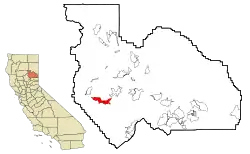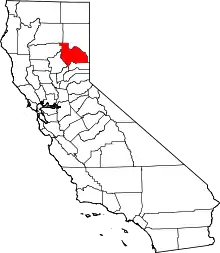Bucks Lake, California
Bucks Lake (also, Bucks Lodge)[3] is a census-designated place (CDP) in Plumas County, California, United States.[4] Bucks Lake is located on the south shore of the lake of the same name, 13 miles (20.9 km) west-southwest of Quincy.[3] The population was 10 at the 2010 census, down from 17 at the 2000 census.
Bucks Lake | |
|---|---|
 Location in Plumas County and the state of California | |
 Bucks Lake Location in the United States | |
| Coordinates: 39°52′21″N 121°10′41″W | |
| Country | |
| State | |
| County | Plumas |
| Area | |
| • Total | 10.35 sq mi (26.81 km2) |
| • Land | 10.34 sq mi (26.78 km2) |
| • Water | 0.01 sq mi (0.02 km2) 0.08% |
| Elevation | 5,167 ft (1,573 m) |
| Population (2010) | |
| • Total | 4,282 |
| • Estimate (2016)[2] | N/A |
| Time zone | UTC-8 (Pacific (PST)) |
| • Summer (DST) | UTC-7 (PDT) |
| ZIP code | 95971 |
| Area code(s) | 530 |
| FIPS code | 06-08744 |
| GNIS feature IDs | 1853378, 2407918 |
| U.S. Geological Survey Geographic Names Information System: Bucks Lake, California; U.S. Geological Survey Geographic Names Information System: Bucks Lake, California; | |
| Reference no. | 197 |
History
The area was first established as a ranch by Horace Bucklin and Francis Walker in 1850.[5] A hotel and a post office were later built on the site. In 1928, Bucks Storage Dam was built on Bucks Creek, a tributary of the Feather River, creating the Bucks Lake reservoir, inundating the original site of the town.[5]
The Bucks Lake post office operated from 1940 to 1942.[3]
Bucks Lake is now registered as California Historical Landmark #197.[5]
Geography
Bucks Lake is located at 39°52′21″N 121°10′41″W (39.872496, -121.178096).[6]
According to the United States Census Bureau, the CDP has a total area of 10.4 square miles (27 km2), of which, 10.3 square miles (27 km2) of it is land and 0.08% is water.
Demographics
| Historical population | |||
|---|---|---|---|
| Census | Pop. | %± | |
| U.S. Decennial Census[7] | |||
2010
At the 2010 census Bucks Lake had a population of 10. The population density was 1.0 people per square mile (0.4/km2). The racial makeup of Bucks Lake was 7 (70.0%) White, 0 (0.0%) African American, 0 (0.0%) Native American, 1 (10.0%) Asian, 0 (0.0%) Pacific Islander, 0 (0.0%) from other races, and 2 (20.0%) from two or more races. Hispanic or Latino of any race were 3 people (30.0%).[8]
The whole population lived in households, no one lived in non-institutionalized group quarters and no one was institutionalized.
There were 4 households, 1 (25.0%) had children under the age of 18 living in them, 3 (75.0%) were opposite-sex married couples living together, 0 (0%) had a female householder with no husband present, 1 (25.0%) had a male householder with no wife present. There were 1 (25.0%) unmarried opposite-sex partnerships, and 0 (0%) same-sex married couples or partnerships. 0 households (0%) were one person and 0 (0%) had someone living alone who was 65 or older. The average household size was 2.50. There were 4 families (100% of households); the average family size was 2.25.
The age distribution was 2 people (20.0%) under the age of 18, 0 people (0%) aged 18 to 24, 2 people (20.0%) aged 25 to 44, 3 people (30.0%) aged 45 to 64, and 3 people (30.0%) who were 65 or older. The median age was 63.3 years. For every 100 females, there were 100.0 males. For every 100 females age 18 and over, there were 100.0 males.
There were 261 housing units at an average density of 25.2 per square mile, of the occupied units 4 (100%) were owner-occupied and 0 (0%) were rented. The homeowner vacancy rate was 33.3%; the rental vacancy rate was 0%. 10 people (100% of the population) lived in owner-occupied housing units and 0 people (0%) lived in rental housing units.
2000
At the 2000 census there were 17 people, 7 households, and 4 families in the CDP. The population density was 1.6 people per square mile (0.6/km2). There were 253 housing units at an average density of 24.5 per square mile (9.5/km2). The racial makeup of the CDP was 100.00% White.[9] Of the 7 households 14.3% had children under the age of 18 living with them, 71.4% were married couples living together, and 28.6% were non-families. 28.6% of households were one person and none had someone living alone who was 65 or older. The average household size was 2.43 and the average family size was 3.00.
The age distribution was 17.6% under the age of 18, 5.9% from 18 to 24, 17.6% from 25 to 44, 52.9% from 45 to 64, and 5.9% 65 or older. The median age was 52 years. For every 100 females, there were 54.5 males. For every 100 females age 18 and over, there were 75.0 males.
The median household income was $56,250 and the median family income was $56,250. Males had a median income of $0 versus $0 for females. The per capita income for the CDP was $23,571. None of the population and none of the families were below the poverty line.
Politics
In the state legislature, Bucks Lake is in the 1st Senate District, represented by Republican Brian Dahle,[10] and the 1st Assembly District, represented by Republican Megan Dahle.[11]
Federally, Bucks Lake is in California's 1st congressional district, represented by Republican Doug LaMalfa.[12]
References
- "2016 U.S. Gazetteer Files". United States Census Bureau. Retrieved Jul 19, 2017.
- "Population and Housing Unit Estimates". Retrieved June 9, 2017.
- Durham, David L. (1998). California's Geographic Names: A Gazetteer of Historic and Modern Names of the State. Clovis, Calif.: Word Dancer Press. p. 360. ISBN 1-884995-14-4.
- U.S. Geological Survey Geographic Names Information System: Bucks Lake, California
- "Bucks Lake". Office of Historic Preservation, California State Parks. Retrieved 2012-10-11.
- "US Gazetteer files: 2010, 2000, and 1990". United States Census Bureau. 2011-02-12. Retrieved 2011-04-23.
- "Census of Population and Housing". Census.gov. Retrieved June 4, 2016.
- "2010 Census Interactive Population Search: CA - Bucks Lake CDP". U.S. Census Bureau. Archived from the original on July 15, 2014. Retrieved July 12, 2014.
- "U.S. Census website". United States Census Bureau. Retrieved 2008-01-31.
- "Senators". State of California. Retrieved March 10, 2013.
- "Members Assembly". State of California. Retrieved March 2, 2013.
- "California's 1st Congressional District - Representatives & District Map". Civic Impulse, LLC. Retrieved March 3, 2013.

